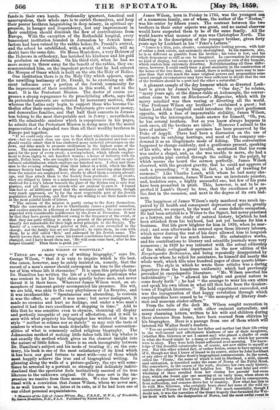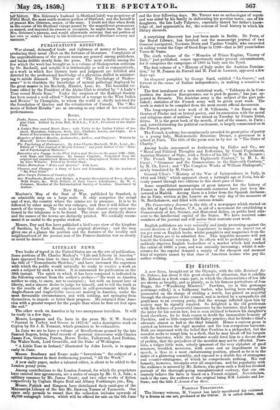JAMES WILSON OF WOODVILLE. * " THERE are so many ways
of writing biography," says Dr. George Wilson, "that it is vain to inquire which is the best. One canon, however, may be safely insisted on namely, that the record of a man's career should correspond in tone to the charac- ter of him whose life it chronicles." It is urn this principle that Dr. Hamilton has written the life of a Christian gentleman who was content to let his light shine quietly before men, and never thrust it in their faces. Wherever James Wilson went, an at- mosphere of innocent gaiety accompanied his presence. His wit, we are told, was akin to the easy playfulness of La Bruyere, and it was inexhaustible : "Spontaneous and abounding, to restrain it was the effort, to exert it was none ; but never malignant, it made no enemies and hurt no feelings and under a wise man's control it had the rare excellence of stopping in time." Add to this that he was sensitive even to shyness, shunning all display and perfectly incapable of any sort of affectation, and it will be seen with what propriety his biographer has written of him in a style "neither so solemn nor so stately" as may suit the taste of readers to whom use has made delectable the dismal convention- alities of what is commonly called religious biography. The Johnsonian method of making little fishes talk like big whales is not exactly the method which gives us the clearest insight into the nature of little fishes. There is no such incongruity between Dr. Hamilton's subject and his mode of treating it; on the con- trary, his book is one of the most satisfactory of its kind which it has been our good fortune to meet with—one of those which most happily achieve the true end of biographical writing. In glancing along the walls of a picture-gallery, the eye will some- times be arrested by a portrait so strongly and delicately indivi- dualized that the spectator feels instinctively assured of its true likeness to the unknown original. Of the same sort is the im- pression we receive from these memoirs. We rise from their pe- rusal with a conviction that James Wilson, whom we never saw, is as well known to us, intim et in cute, as if he had been one of our oldest personal acquaintances.
• Memoirs of the Life of James Wilson, Esq., F.E.E.E., .3I.W.S„ of Woodrilk. By James Hamilton, D.D., F.L.S. Published by Nisbotand Co.
James Wilson, born in Paisley in 1795, was the youngest son of a numerous family, one of whom, the author of the " Nodes," was his senior by fifteen years. The contrast between the two brothers in their outer aspects was great, and no casual observer would have suspected them to be of the same family. All the world knows what manner of man was Christopher North. The following is the description of the younger brother, given forty years ago by Lockhart in his " Peter's Letters."
"James is a thin, pale, slender, contemplative looking person, with hair of rather a dark colour, and extremely shortsighted. In his manners, also he is as different as possible from his brother his voice is low, and his whole demeanour as still as can be imagined. In conversation he attempts no kind of display, but seems to possess a very peculiar vein of dry humour, which renders him extremely diverting. Notwithstanding all these differ- ences, however, I could easily trace a great similarity in the construction of the bones of the two faces ; and, indeed, there is nothing more easy to ima- gine than that with much the same original powers and propensities some casual enough circumstances may have been sufficient to decide that the one of the brothers should be a poet and the other a naturalist."
A pleasant sample of the dry humour which so diverted Lock- hart is given by James's biographer. " One day," he relates, " many years ago, at the dinner-table at Ardencaple, the conver- sation came to turn on Blackwood's Magazine, which with its merry mischief was then vexing or diverting all the world. Has Professor Wilson any brothers ? ' exclaimed a guest ; but before Lord John Campbell could introduce the quiet gentleman opposite, with a face of impenetrable stolidity, James Wilson, turning to the interrogator, made answer for himself, Oh, yes, he has several brothers. But as you know always happens in such cases all the brothers are idiots ! However I submit to the laws of nature.'" Another specimen has been preserved by the Duke of Argyll. There had been a disoussion on the use of trawl-nets in catching herrings, and most of the company con- demned it as an illegitimate mode of fishing. The conversation happened to change suddenly, and a gentleman present, speaking of his wife, who was a great invalid, mentioned that her room was under a chapel, and, as she was unable to move, she had a gutta percha pipe carried through the ceiling to the pulpit, by which means she heard the sermon perfectly. James Wilson observed, with the greatest gravity, that he could not approve ve of such a proceeding ; "it was in fact, a kind of trawling for sermons:" Like Charles Lamb, with whom he had many oha- racteristies in common, James Wilson was an inveterate punster, and, tradition says, a highly successful one, but few of his puns have been preserved in print. This, however, is not to be re- gretted if Lamb's theory be true, that the excellence of a pun lies first in the occasion, and next in the degree of its own bad- ness.
The happiness of James Wilson's early manhood was much im- paired by ill health and consequent depression of spirits, greatly aggravated, we suspect, by the want of some definite occupation. He had been articled to a Writer to the Signet, but never practised as a lawyer, and the study of natural history, to:which he had been attached. from his boyhood, had not yet become for him a business. But life grew brighter for him in 1824, when he mar- ried; and soon afterwards he entered upon those literary labours, which never during the rest of his days allowed him to languish under the curse of too much leisure. His substantive works, and his contributions to literary and scientific journals were very numerous ; in 1829 he was intrusted with the actual editorship of the whole zoological department in the new edition. of the Encyclopedia Britannica, and being repeatedly disappointed by others on whom he relied for assistance, he himself did nearly the whole work, which fills nine hundred pages of close quarto letter- press. The style in which he wrote these articles was a daring departure from the humdrum uniformity which had previously prevailed in eneyolopEedie literature. Mr. Wilson asserted his individuality " ; he "allowed his bright and genial nature to come freely forth" ; he had "the courage to wear his own attire and speak his own idiom in what till then had been the-Quaker- town of English literature." His bold. experiment succeeded, and was the inauguration of that happy revolution through which encyclopaedias have ceased to be "the monopoly of literary dust- men and museum cinder-sifters."
From the toils of the desk Mr. Wilson sought recreation in annual excursions along with other eminent naturalists, and many charming letters, written to his wife and children during these absences from home, have been rescued from oblivion by his biographer. Here is a passage from one of them which will interest Sir Walter Scott's readers.
"You are probably aware that her father and mother lost their life owing to the well-meant and affectionate kindness of one of their daughters, (whether Mrs. Grierson or not I cannot say) who placed a chaffer of coals in what she feared might be a damp or airless room, in which her parents were to sleep. They were both found soffocated next morning. The know- ledge of this dreadful catastrophe la, of course, not new either to myself or you. But this other related fact, or rather fiction, seems to have sprung out of it though not that I know of traced to its source, either by John Lockhart or any other of Sir Walter Scott's biographical commentators. In the novel, called the 'Pirate,' the scene of which is laid in Shetland, a wild, almost mad enthusiast, is described under the name of Norna of the Fitful Head. She somewhere, in the course of the work, discloses her own early history, and the dire calamities which had befallen her. The most fatal and over- whelming of these resulted from her closing her parents' bed-room door, which she found ajar one morning at an early hour, when about to fulfil an assignation with her lover. Her parents both died in consequence, from suffocation, and remorse drove her to insanity. Now what has this to do with Mrs. Grierson, who certainly bears about her none of the wild ec- centricities of Norna of the Fitful Head ? Not much essentially, though I doubt not, it was the narration of the Grant tragedy that furnished Sir though
Scott with both the designation of Horne, and the most awful event in
hdr history.. Mrs. Grierson's husband (a Shetland laird) was proprietor of Fitful Head, the most south-western portion of Shetland, and she herself is at present Mrs. Grierson, senior, of the same. I doubt not that when Scott in the course of his Shetland voyage passed by the magnificent promontory so named, and inquired its owners or occupiers, he might learn the fate of Mrs. Grierson's parents, and would afterwards entwine that sad portion of her own or sister's history in his fictitious picture of Shetland scenery and manners."



























 Previous page
Previous page